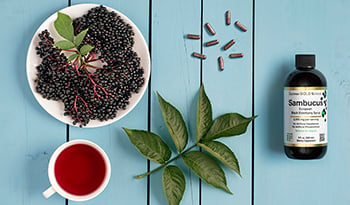7 immuniteettia tukevaa ravintolisää lapsille

Keskeisiä huomioita
- Perusasiat kuntoon: Tasapainoinen ruokavalio, riittävä uni ja hyvä hygienia ovat tärkeimmät tekijät lapsen immuuniterveydelle.
- Tärkeät lisäravinteet: Tutkituimmat lasten immuniteettia tukevat lisäravinteet ovat C-vitamiini, D-vitamiini, sinkki ja probiootit.
- Milloin käyttää: Lisäravinteet voivat olla erityisen hyödyllisiä kouluun palaamisen aikana, talvikuukausina tai jos lapsesi on nirso syöjä.
- Turvallisuus on avainasemassa: Ota aina yhteyttä lastenlääkäriin ennen uuden lisäravinteen käytön aloittamista ja valitse tuotteet, jotka on erityisesti suunniteltu lapsille.
Immuunijärjestelmän tukeminen
Vahva immuunijärjestelmä on suuri tekijä lasten terveyden ja menestymisen kannalta. Lapset joutuvat päivittäin kosketuksiin monien uusien bakteerien, virusten ja muiden mikrobien kanssa, niin luokkahuoneissa kuin leikkikentillä. Kun heidän immuunijärjestelmänsä toimii hyvin, se auttaa torjumaan vilustumista, flunssaa ja muita infektioita, jotta lapset voivat kasvaa, oppia ja nauttia elämästä täysillä. Koska lasten puolustuskyky on vielä kehitysvaiheessa, voi oikeanlaisella ravinnolla ja keskeisillä ravintolisillä tarjota tukea, joka auttaa pitkälle kestävän terveyden rakentamisessa.
Parhaat lisäravinteet lasten immuniteetin tueksi
Vanhemmat voivat auttaa vahvistamaan lastensa immuunijärjestelmää käyttämällä tärkeitä ravintolisiä. Tässä on seitsemän parasta:
1. A-vitamiini: ”tartuntaa ehkäisevä” vitamiini
A-vitamiini eli retinoli on ensimmäinen löydetty rasvaliukoinen vitamiini, mutta se ei ole ainoa syy, miksi sitä kutsutaan nimellä ”A”. Vitamiini sai nimensä myös ”anti-infektiivisten” ominaisuuksiensa ansiosta. A-vitamiini on kriittinen ihon solujen ja limakalvojen terveydelle ja toiminnalle, jotka toimivat ensimmäisinä puolustuslinjoina infektioita vastaan.
Lisäksi A-vitamiini on välttämätön valkosolujen asianmukaiselle toiminnalle ja parantaa monia immuunijärjestelmän toimintoja, mukaan lukien kateenkorvan toiminta, kasvainten torjunta ja vasta-ainevaste. A-vitamiini onkin erityisen tärkeä virusten torjunnassa.
Tutkimuksissa on havaittu esimerkiksi, että alhaisemmat A-vitamiinitasot tekevät ihmisistä paljon alttiimpia virusperäisille hengitystieinfektioille. Lisäksi on olemassa huomattavaa tieteellistä näyttöä siitä, että lasten A-vitamiinilisä tuottaa merkittäviä etuja lasten immuunitoiminnan parantamisessa virusinfektion aikana.
A-vitamiinilisän on osoitettu olevan ratkaisevan tärkeää monissa osissa maailmaa asuvien lasten terveyden parantamisessa.1
2. Sinkki: immuniteetin ”portinvartija”
Sinkkiä kutsutaan immuniteetin ”portinvartijaksi”, koska se liittyy suoraan niin moniin immuunitoiminnan osa-alueisiin. Kun sinkkitaso on alhainen, immuunikyky laskee huomattavasti tiettyjen virusta torjuvien valkosolujen määrän laskun vuoksi. Samoin vähenevät immuunijärjestelmän keskeiset aktivaattorit ja hormonit kateenkorvasta, immuunijärjestelmää hallitsevasta rauhasesta.
Sinkki voi myös toimia suoraan tiettyjä viruksia vastaan, kuten tavalliset flunssanaiheuttajat. Lisäksi sinkki on kriittinen terveille hengitysteiden ja ruuansulatuskanavan limakalvoille sekä ravinteiden asianmukaiselle imeytymiselle suolistossa. Jos sinkkiä ei ole riittävästi, koko immuunijärjestelmä heikkenee ja infektioriski kasvaa dramaattisesti.3-5
Sinkkiä on saatavana monissa muodoissa, kuten tabletteina, kapseleina ja imeskelytabletteina.
3. C-vitamiini: avain immuniteettiin
C-vitamiini on tärkein ravintolisä, jota useimmat ihmiset ajattelevat pohtiessaan immuunijärjestelmän tukemista, etenkin vilustumisen kanssa painiessaan.
Muiden välttämättömien ravintoaineiden tavoin C-vitamiini on erittäin tärkeä immuunijärjestelmän toiminnalle. C-vitamiini tarjoaa kriittistä tukea infektioiden luontaisille esteille, kuten iho ja limakalvot. Lisäksi C-vitamiini kirjaimellisesti käynnistää valkosolut niiden hyökätessä tunkeilijoita vastaan sekä tehostaa kehon viruksia torjuvaa yhdistettä, interferonia. Se tukee myös vasta-aineiden tuotantoa ja hormonien eritystä kateenkorvasta.6
Kuten sinkki, C-vitamiini voi tehostaa kehon puolustusmekanismeja viruksia vastaan, mikä selittää osaltaan sen käytön vilustumisen torjunnassa. Infektion ja stressin aikana C-vitamiinin tarve kasvaa. Stressin aiheuttama C-vitamiinipitoisuuden lasku on yksi syy siihen, miksi ihmiset ovat alttiimpia flunssalle stressaavien tapahtumien tai tilanteiden aikana.7
C-vitamiinia on saatavana kaikissa ravintolisämuodoissa, ja monet tuotteet on suunniteltu erityisesti imeväisille ja lapsille.
4. D-vitamiini: luuston ja immuunijärjestelmän tuki
Ihomme tuottaa D-vitamiinia auringon UV-valon vaikutuksesta ja sitä voi saada elintarvikkeista, kuten D-vitamiinilla vahvistetuista maitotuotteista ja rasvaisesta kalasta. D3-vitamiinilisän käyttäminen on kuitenkin tärkeää riittävien tasojen varmistamiseksi, etenkin lapsilla. Tämä ei tue vain immuunijärjestelmää, vaan myös luuston terveyttä.
D3-vitamiinin on osoitettu tuottavan monenlaisia immuunijärjestelmää parantavia vaikutuksia. Useat suuret tutkimukset ovat osoittaneet, että hengitysteiden virusinfektioiden määrä on pienempi ihmisillä, joilla on korkeampi veren D3-vitamiinipitoisuus sekä ihmisillä, jotka käyttävät D3-vitamiinia ravintolisänä.8,9
British Medical Journal -lehdessä julkaistussa meta-analyysissä havaittiin, että henkilöillä, joilla oli alhainen veren D3-vitamiinipitoisuus ja jotka ottivat D3-lisäainetta, se vähensi hengitystieinfektioita 70 %. Tiedot kerättiin 25:sta satunnaistetusta kontrolloidusta tutkimuksesta, joissa oli yhteensä 11 321 osallistujaa, iältään imeväisistä 95-vuotiaisiin ihmisiin.8
Annostussuositukset:
- Alle 5–vuotiaille lapsille suosittelen noin 50 IU puolta kiloa kohden päivässä.
- 5–9-vuotiaille lapsille suosittelen 2 000 IU päivässä.
- 9–12-vuotiaille lapsille suosittelen 2 500 IU päivässä.
- Yli 12-vuotiaille lapsille suosittelen aikuisten annosta eli 2 000–5 000 IU päivässä.
5. Omega-3-rasvahapot: solukalvojen perusta
Kala- ja leväöljyravinteiden sisältämillä pitkäketjuisilla omega-3-rasvahapoilla, EPA (eikosapentaeenihappo) ja DHA (dokosaheksaeenihappo), on tärkeä rooli lasten immuunitoiminnan muodostumisessa.
Niiden perustoiminto on solukalvojen komponentteina. DHA ja EPA toimivat valkosolujen (T-solut, B-solut, makrofagit) kalvoissa solujen signaloinnin ja viestinnän parantamiseksi. Tämän perustoiminnon avulla nämä immuunisolut voivat tarvittaessa reagoida tehokkaammin. Ne auttavat myös valkosoluja muodostamaan tehokkaita vasta-aine- ja soluvälitteisiä immuunivasteita. EPA ja DHA ovat tärkeitä myös tasapainoisen immuunivasteen varmistamisessa ja tulehduksen säätelyssä, mikä on tärkeää kudosvaurioilta suojautumisessa. Tämä tasapaino on erityisen tärkeä lapsilla, jotka vielä kehittävät vastustuskykyään uusia mikrobeja ja ympäristöuhkia vastaan.10
Lapsiin keskittyneet tutkimukset osoittavat alustavasti, että suurempi omega-3-saanti liittyy hengitystieinfektioiden ja allergioiden alhaisempaan esiintyvyyteen. Nämä tulokset korostavat EPA:n ja DHA:n merkitystä immuunitoiminnan säätelyssä.10,11
Tässä on suositukseni päivittäisestä annostuksesta lapsille:
- Lapset 0–2 vuotta: 200–300 mg/vrk (vähintään 100 mg DHA)
- Lapset 2–6 vuotta: 200–300 mg/vrk (≥ 60 % EPA)
- 6–12-vuotiaat lapset: 500–1000 mg/vrk (≥ 60 % EPA)
- Lapset > 12 vuotta: 1 200–2 000 mg/vrk (≥ 60 % EPA)
6. Probiootit: suolistoterveyden sankarit
Tiesitkö, että yli 70 prosenttia ihmisen immuunijärjestelmästä sijaitsee ruoansulatuskanavassa?
Probiootit ovat hyödyllisiä bakteereja, kuten hiiva ja muut mikro-organismit, joita löytyy ihmisen suolistosta. Mikrobiomi tarkoittaa kehomme sisältämien mikrobien geneettistä materiaalia ja probiootit voivat auttaa mikrobiomin terveyden edistämisessä. Ihmisen suoliston mikrobiomilla on valtava rooli yleisessä terveydessä, erityisesti immuunijärjestelmän toimintakyvyssä.
Probioottiset lisäravinteet sisältävät turvallisesti pakastekuivattuja eläviä hyödyllisiä bakteereja tai hiivaa kapseli-, neste- tai elintarvikemuodossa. Näitä lisäravinteita on tutkittu laajasti johtuen niiden kyvystä tukea immuunitoimintaa, etenkin lapsuudessa. Niiden edut johtuvat suurelta osin siitä, miten ne ovat vuorovaikutuksessa suoliston mikrobiomin kanssa, jolla on keskeinen rooli immuunijärjestelmän säätelyssä. Probioottiset lisäravinteet tukevat myös immuuniterveyttä vahvistamalla suolistoa, tasapainottamalla immuunivasteita, tehostamalla vasta-aineiden tuotantoa ja vähentämällä infektioriskiä. Hyödyt ovat kantakohtaisia, ja Lactobacillus- ja Bifidobacterium -lajeja tutkitaan eniten immuunivaikutusten suhteen.12-14
Monet probioottien valmistajat tarjoavat tuotteita, jotka on suunniteltu lapsille sekä tietyille ikäluokille, sukupuolille tai muille ryhmille suunnattuja vaihtoehtoja. Onnistuneita tuloksia saavutetaan useimmiten ottamalla 5–20 miljardia elinkelpoista organismia päivässä. On suositeltavaa käyttää probioottisia lisäravinteita määriteltyjen kantojen kanssa, jotka on testattu ihmisillä kliinisissä tutkimuksissa.
7. Hiivan beetaglukaanit: vahva tuki valkosoluille
Beetaglukaanit ovat kuitutyyppisiä polysakkarideja (monimutkaisia sokereita), joita löytyy useista eri lähteistä. Hiivan beetaglukaani, erityisesti leipomohiivan (Saccharomyces cerevisiae), eroaa rakenteellisesti muista lähteistä peräisin olevista beetaglukaaneista, kuten kaurasta ja ohrasta, sekä lääkesienistä, kuten maitakesta ja reishistä.
Hiivan beetaglukaanin tärkeimmät terveyshyödyt ovat immuunijärjestelmälle. Ihmisen valkosoluilla on itse asiassa solupinnoillaan reseptorikohtia hiivan beetaglukaanille. Ja aivan kuten lukon voi avata vain sopivalla avaimella, osuvat nämä reseptorikohdat tarkoin yksiin hiivan beetaglukaanin rakenteen kanssa. Kun hiivan beetaglukaani sitoutuu reseptoriin, se aktivoi valkosoluja hyvin erityisillä tavoilla auttaakseen torjumaan tunkeutuvia organismeja. Kirjaimellisesti kymmenet tuhannet tieteelliset tutkimukset ovat dokumentoineet hämmästyttäviä tapoja, joilla nämä luonnolliset yhdisteet pystyvät aktivoimaan valkosoluja erittäin turvallisella ja kontrolloidulla tavalla.
Kliiniset tutkimukset ihmisillä ovat vahvistaneet, että nämä vaikutukset tuottavat positiivisia tuloksia. Hiivan beetaglukaanin annoksella 500 mg päivässä, yleensä 250 mg kahdesti vuorokaudessa, on osoitettu yli kahdessakymmenessä kliinisessä kaksoissokkotutkimuksessa olevan monia vaikutuksia, jotka ovat hyödyllisiä ylempien hengitysteiden infektioiden (vilustuminen ja flunssa) estämisessä. Lapsille tämä tarkoittaa harvemmin poissaoloja koulusta. Jos lapsi kuitenkin vilustuu ovat oireet yleensä lievempiä kuin lumelääkeryhmän lapsilla.15
Immuunijärjestelmän ymmärtäminen
Immuunijärjestelmä on kehon tärkein puolustusverkosto, joka auttaa suojaamaan lapsia sairastumiselta. Se koostuu monista osista, mukaan lukien valkosolut, iho ja limakalvot, suolisto, imusolmukkeet ja erikoistuneet rauhaset, kuten kateenkorva ja perna. Kokonaisuudessaan tämä järjestelmä muodostaa suojan, joka tunnistaa virukset, bakteerit ja muut haitalliset hyökkääjät ja reagoi niihin.
Terve immuunijärjestelmä ei ainoastaan auta lapsia torjumaan infektioita, vaan myös muistaa aiemmat altistumiset, jotta keho voi reagoida nopeammin seuraavan kerran saman tarttuvan organismin kohdatessaan.
Miten immuunijärjestelmä toimii?
Immuunijärjestelmässä on kaksi eri osaa: synnynnäinen ja mukautuva.
Luontainen immuunijärjestelmä on ensimmäinen puolustuslinja. Se sisältää esteitä, kuten iho, vatsahappo ja nopeasti vaikuttavat immuunisolut, jotka torjuvat hyökkääjiä. Synnynnäinen järjestelmä ei ole tarkka, mikä tarkoittaa, että se tappaa kaikki uhat ottamatta huomioon, mitä ne ovat. Upea esimerkki synnynnäisestä immuniteetista on vatsahappo. Se on puolustusmekanismi, joka on suunniteltu tuhoamaan välittömästi bakteeri, virus tai loinen, jos sellainen niellään.1
Jos organismi pääsee ensimmäisen puolustuslinjan ohi, mukautuva immuunijärjestelmä astuu kuvioihin. Tämä järjestelmän osa valmistaa erikoistuneita soluja ja vasta-aineita, jotka kohdistuvat tiettyyn pöpöön ja rakentavat ”muistia”. Jos lapsi altistuu samalle tarttuvalle organismille tulevaisuudessa, järjestelmä voi poistaa sen nopeasti.
Loppuyhteenveto
Kuten tiedämme, ennaltaehkäisy on monesti hoitoa helpompaa. Monet tutkimukset osoittavat, että immuunitoiminnan vahvistaminen millä tahansa näistä seitsemästä lisäravinteesta voi olla hyödyllistä infektioiden, erityisesti flunssan, torjunnassa. Joka tapauksessa joidenkin tai kaikkien näiden lisäravinteiden yhdistämisestä lapsesi immuunijärjestelmän tueksi ei ole mitään haittaa.
Jos lapsesi sattuu vilustamaan, on olemassa lukuisia muita ravintolisiä, jotka voivat auttaa. Tärkein näistä on eurooppalainen musta seljanmarja (Sambucus nigra), joka sisältää runsaasti antosyaaneina tunnettuja yhdisteitä, jotka myös antavat marjalle sen syvän, tummanvioletin värin. Lukuisat tieteellisessä kirjallisuudessa julkaistut tutkimukset osoittavat, että musta seljanmarja tukee immuunitoimintaa. Lisäksi aikuisilla on saatu joitain kliinisiä todisteita hyödyistä, jos sitä käytetään flunssan aiheuttamien ylähengitystieoireiden alkaessa.16,17
Tutkimus 5–12-vuotiailla lapsilla, joilla oli merkittäviä ylähengitysteiden oireita, ei kuitenkaan osoittanut mitään hyötyä mustan seljanmarjan käytöstä ravintolisänä. Huomaamme jälleen kerran, että painopisteen tulisi olla ennaltaehkäisyssä.
Seljanmarjavalmisteita on saatavana kapseleina ja tabletteina sekä lapsille siirappina, nesteenä tai viinikumeina.
Viitteet:
- Imdad A, Mayo-Wilson E, Haykal MR, et al. Vitamin A supplementation for preventing morbidity and mortality in children from six months to five years of age. Cochrane Database Syst Rev. 2022 Mar 16;3(3):CD008524.
- Borel P, Desmarchelier C. Genetic Variations Associated with Vitamin A Status and Vitamin A Bioavailability. Nutrients. 2017 Mar 8;9(3):246.
- Wessels I, Maywald M, Rink L. Zinc as a Gatekeeper of Immune Function. Nutrients. 2017 Nov 25;9(12).
- Read SA, Obeid S, Ahlenstiel C, Ahlenstiel G. The Role of Zinc in Antiviral Immunity. Adv Nutr. 2019 Jul 1;10(4):696-710.
- Wessels I, Fischer HJ, Rink L. Dietary and Physiological Effects of Zinc on the Immune System. Annu Rev Nutr. 2021 Oct 11;41:133-175.
- Carr AC, Maggini S. Vitamin C and Immune Function. Nutrients. 2017;9(11):1211.
- Hemilä H, Chalker E. Vitamin C reduces the severity of common colds: a meta-analysis. BMC Public Health. 2023 Dec 11;23(1):2468.
- Martineau Adrian R, Jolliffe David A, Hooper Richard L, Greenberg Lauren, Aloia John F, Bergman Peter et al. Vitamin D supplementation to prevent acute respiratory tract infections: systematic review and meta-analysis of individual participant data BMJ 2017; 356 :i6583
- Pham H, Rahman A, Majidi A, Waterhouse M, Neale RE. Acute Respiratory Tract Infection and 25-Hydroxyvitamin D Concentration: A Systematic Review and Meta-Analysis. Int J Environ Res Public Health. 2019;16(17):3020.
- Bodur M, Yilmaz B, Ağagündüz D, Ozogul Y. Immunomodulatory Effects of Omega-3 Fatty Acids: Mechanistic Insights and Health Implications. Mol Nutr Food Res. 2025 May;69(10):e202400752.
- Gorczyca D, Szeremeta K, Paściak M, et al. Association of Serum Polyunsaturated Fatty Acids (PUFAs) and Children's Dietary Inflammatory Index (C-DIITM) with Recurrent Respiratory Infections in Children: A Cross-Sectional Study. Nutrients. 2024 Dec 31;17(1):153.
- Carucci L, Coppola S, Luzzetti A, et al. The role of probiotics and postbiotics in modulating the gut microbiome-immune system axis in the pediatric age. Minerva Pediatr (Torino). 2021 Apr;73(2):115-127.
- Zhang CX, Wang HY, Chen TX. Interactions between Intestinal Microflora/Probiotics and the Immune System. Biomed Res Int. 2019 Nov 20;2019:6764919.
- Jankiewicz M, Łukasik J, Kotowska M, et al. Strain-Specificity of Probiotics in Pediatrics: A Rapid Review of the Clinical Evidence. J Pediatr Gastroenterol Nutr. 2023 Feb 1;76(2):227-231.
- Zhong K, Liu Z, Lu Y, Xu X. Effects of yeast β-glucans for the prevention and treatment of upper respiratory tract infection in healthy subjects: a systematic review and meta-analysis. Eur J Nutr. 2021 Dec;60(8):4175-4187.
- Wieland LS, Piechotta V, Feinberg T, et al. Elderberry for prevention and treatment of viral respiratory illnesses: a systematic review. BMC Complement Med Ther. 2021 Apr 7;21(1):112.
- Tiralongo E, Wee SS, Lea RA. Elderberry Supplementation Reduces Cold Duration and Symptoms in Air-Travellers: A Randomized, Double-Blind Placebo-Controlled Clinical Trial. Nutrients. 2016;8(4):182. Published 2016 Mar 24.
- Macknin M, Wolski K, Negrey J, Mace S. Elderberry Extract Outpatient Influenza Treatment for Emergency Room Patients Ages 5 and Above: a Randomized, Double-Blind, Placebo-Controlled Trial. J Gen Intern Med. 2020 Nov;35(11):3271-3277.
VASTUUVAPAUSLAUSEKE:Tämän hyvinvointiblogin tarkoituksena ei ole tarjota diagnooseja...
















































































 Sisällysluettelo
Sisällysluettelo















